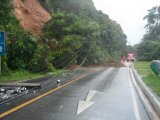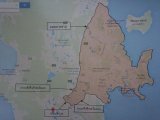THE TRIAL of two Thailand-based journalists from the online news outlet, Phuketwan, accused of criminally defaming the Royal Thai Navy, appeared to be a very sabai sabai affair as I monitored the trial for the International Commission of Jurists (ICJ) held between 14 and 16 July in Phuket, Thailand.
But beneath its calm surface, the proceedings were part of an insidious and exceptional legal battle, as a government institution - the Royal Thai Navy - sought criminal punishment for the defamation of its reputation.
The presiding judge was not antagonistic toward the defence, and I observed no obvious procedural irregularities during the trial.
Initially, eight defence lawyers faced off against a sole prosecutor. However, on the morning of the second day the prosecutor notified the Judge that she had no questions for the defence witnesses and disappeared for the remainder of the trial.
On July 17, 2013, Phuketwan published an article that contained a paragraph lifted from a Pulitzer award winning Reuters article that alleged that ''Thai naval forces'' were complicit in the smuggling of Rohingya, a persecuted ethnic minority from Myanmar.
In December 2013, the Royal Thai Navy reacted by filing a complaint against Big Island Media, the parent company of Phuketwan, and the two Phuket-based journalists, Chutima Sidasathian and Alan Morison, alleging criminal defamation under the Thai Criminal Code and violation of Article 14 of the Computer Crimes Act.
The maximum penalties for these crimes are two years and five years imprisonment, respectively.No charges have been filed against Reuters.
Numerous governments, UN agencies and human rights groups, including the ICJ, have called for the charges to be dropped. Article 19 of the International Covenant on Civil and Political Rights, to which Thailand is a State Party, guarantees the right to freedom of expression, which includes the right to impart information.
Defamation laws should never be used to criminalise free expression, particularly when the expression involves criticism of public authorities, made without malice and in the public interest, as was undoubtedly the case here.
To guard against such violations of freedom of expression, the UN Special Rapporteur on Freedom of Expression, the Human Rights Committee, the ICJ and other international experts have urged states to abolish criminal defamation entirely.
The case comes against the background of international furor surrounding the discovery of mass graves allegedly linked to traffickers on both sides of the Thailand-Malaysia border and the horrific plight of thousands of Rohingya and Bangladeshis who were found adrift in the Andaman Sea.
Still, the Thai government pursued the case, which was one of the facts noted by the US State Department when its gave Thailand the lowest rating for the second year running, Tier Three, in its influential 2015 Trafficking in Persons Report.
There has been speculation that the low key (and eventually, nonexistent) prosecutorial presence suggested the Government was not pushing the case hard, but according to experienced Thai lawyers, the prosecution sometimes leaves a trial when it is confident of its case.
The four witnesses for the prosecution mostly testified about the administrative aspects of the case: The first was the Navy officer who made the complaint, while the other three were the police officers who received and acted upon it.
The investigation appeared to have been rather superficial. For example, the police failed to verify whether the paragraph in question had originated from Reuters, did not interview anyone other than two Phuketwan journalists, and had not checked the Thai translation of the article relied on by the Navy which erroneously translated '''Thai naval forces'' into ''Royal Thai Navy,'' this being a key part of the defence case.
While waiting for the arrival of the final prosecution witness, the Judge asked one of the journalists, Chutima Sidasathian, why the case had not settled at a mediation facilitated by the National Human Rights Commission.
She answered that despite their best efforts to reach a settlement, she and her co-accused were not prepared to apologise for exercising their journalistic duty to report on matters in the public interest, especially when the facts were reproduced from the story of another news agency.
During the trial, both sides said there was no animosity between the Royal Thai Navy and the Phuketwan journalists who have regularly reported favorably on the Royal Thai Navy's activities.
Earlier this year, Chutima Sidasathian, who is studying for a Ph.D on the Rohingya, had been asked by the Prime Minister's office to advise it on the Rohingya crisis.
The defence presented their case through seven witnesses, including both accused.
Their evidence sought to establish that the journalists were merely exercising their duty to report on matters in the public interest, they had never intended to defame the Royal Thai Navy but had simply reproduced one passage from a Reuters article that referred to ''Thai naval forces'' not the Royal Thai Navy who were therefore not a damaged party, and that the Computer Crimes Act was never intended to apply to cases of this kind.
As the prosecutor was absent during the entire defence case, this evidence was not challenged.
The defendants, their Thai media colleagues, and the international community now await the verdict, which will be delivered on September 1, 2015.
Regardless of the outcome and based on the proceedings so far, it is clear that under international law, the Royal Thai Navy and the prosecution must immediately withdraw the charges, and that Thailand's criminal defamation laws should be scrapped to ensure compliance with its international obligations.
Journalists in Thailand must never again face such ill-founded proceedings, or hesitate to report on matters in the public interest for fear of being unjustly dragged through the courts by the authorities.
Kingsley Abbott is the ICJ's International Legal Adviser for Southeast Asia.
http://www.bangkokpost.com/opinion/opinion/643480/prosecutor-disappears-in-dubious-phuketwan-trial
COMPOSED OF 60 eminent judges and lawyers from all regions of the world, the International Commission of Jurists promotes and protects human rights through the Rule of Law, by using its unique legal expertise to develop and strengthen national and international justice systems. Established in 1952 and active on the five continents, the ICJ aims to ensure the progressive development and effective implementation of international human rights and international humanitarian law; secure the realisation of civil, cultural, economic, political and social rights; safeguard the separation of powers; and guarantee the independence of the judiciary and legal profession.
From its regional headquarters in Bangkok, ICJ has been working for several years to improve the rule of law and respect for human rights in Southeast Asia. The region has shown remarkable economic and political growth in the past decade, but the development has been uneven, with significant reverses in terms of the human rights situation as well as ongoing failures to respond to demands for justice and accountability.
ALAN MORISON and Chutima Sidasathian remain on bail of 100,000 baht each, provided by the Andaman Community Rights and Legal Aid Centre, based in Trang province. Other groups and organisations have also offered financial help.
Most of the legal costs of the case are being met by the London-based Media Legal Defence Initiative.
In Thailand, a group of more than 10 lawyers have teamed up to provide legal counsel. They include SR Law, the Human Rights Lawyers' Association and iLaw.
WATCH Journey into Hell, by Four Corners
From Burma through Thailand, an award-winning current affairs team traces official complicity in the brutal treatment of the Rohingya and Phuketwan's part in its exposure.
http://www.abc.net.au/4corners/stories/2015/06/22/4257490.htm
WATCH How Trafficking Works
Phuketwan Investigative reporter Chutima Sidasathian, still being sued for criminal defamation over a Reuters paragraph: ''It's worse and worse, day by day. Nobody cares''.
http://journeyman.tv/67116/short-films/rohingya-hd.html
LISTEN to The Rohingya Solution
A tragedy almost beyond words has been unfolding in Thailand, where a human smuggling network is thriving with the full knowledge of some corrupt law enforcement officers. Alan Morison of Phuketwan talks to Australia's AM program.
http://www.abc.net.au/am/content/2015/s4231108.htm
But beneath its calm surface, the proceedings were part of an insidious and exceptional legal battle, as a government institution - the Royal Thai Navy - sought criminal punishment for the defamation of its reputation.
The presiding judge was not antagonistic toward the defence, and I observed no obvious procedural irregularities during the trial.
Initially, eight defence lawyers faced off against a sole prosecutor. However, on the morning of the second day the prosecutor notified the Judge that she had no questions for the defence witnesses and disappeared for the remainder of the trial.
On July 17, 2013, Phuketwan published an article that contained a paragraph lifted from a Pulitzer award winning Reuters article that alleged that ''Thai naval forces'' were complicit in the smuggling of Rohingya, a persecuted ethnic minority from Myanmar.
In December 2013, the Royal Thai Navy reacted by filing a complaint against Big Island Media, the parent company of Phuketwan, and the two Phuket-based journalists, Chutima Sidasathian and Alan Morison, alleging criminal defamation under the Thai Criminal Code and violation of Article 14 of the Computer Crimes Act.
The maximum penalties for these crimes are two years and five years imprisonment, respectively.No charges have been filed against Reuters.
Numerous governments, UN agencies and human rights groups, including the ICJ, have called for the charges to be dropped. Article 19 of the International Covenant on Civil and Political Rights, to which Thailand is a State Party, guarantees the right to freedom of expression, which includes the right to impart information.
Defamation laws should never be used to criminalise free expression, particularly when the expression involves criticism of public authorities, made without malice and in the public interest, as was undoubtedly the case here.
To guard against such violations of freedom of expression, the UN Special Rapporteur on Freedom of Expression, the Human Rights Committee, the ICJ and other international experts have urged states to abolish criminal defamation entirely.
The case comes against the background of international furor surrounding the discovery of mass graves allegedly linked to traffickers on both sides of the Thailand-Malaysia border and the horrific plight of thousands of Rohingya and Bangladeshis who were found adrift in the Andaman Sea.
Still, the Thai government pursued the case, which was one of the facts noted by the US State Department when its gave Thailand the lowest rating for the second year running, Tier Three, in its influential 2015 Trafficking in Persons Report.
There has been speculation that the low key (and eventually, nonexistent) prosecutorial presence suggested the Government was not pushing the case hard, but according to experienced Thai lawyers, the prosecution sometimes leaves a trial when it is confident of its case.
The four witnesses for the prosecution mostly testified about the administrative aspects of the case: The first was the Navy officer who made the complaint, while the other three were the police officers who received and acted upon it.
The investigation appeared to have been rather superficial. For example, the police failed to verify whether the paragraph in question had originated from Reuters, did not interview anyone other than two Phuketwan journalists, and had not checked the Thai translation of the article relied on by the Navy which erroneously translated '''Thai naval forces'' into ''Royal Thai Navy,'' this being a key part of the defence case.
While waiting for the arrival of the final prosecution witness, the Judge asked one of the journalists, Chutima Sidasathian, why the case had not settled at a mediation facilitated by the National Human Rights Commission.
She answered that despite their best efforts to reach a settlement, she and her co-accused were not prepared to apologise for exercising their journalistic duty to report on matters in the public interest, especially when the facts were reproduced from the story of another news agency.
During the trial, both sides said there was no animosity between the Royal Thai Navy and the Phuketwan journalists who have regularly reported favorably on the Royal Thai Navy's activities.
Earlier this year, Chutima Sidasathian, who is studying for a Ph.D on the Rohingya, had been asked by the Prime Minister's office to advise it on the Rohingya crisis.
The defence presented their case through seven witnesses, including both accused.
Their evidence sought to establish that the journalists were merely exercising their duty to report on matters in the public interest, they had never intended to defame the Royal Thai Navy but had simply reproduced one passage from a Reuters article that referred to ''Thai naval forces'' not the Royal Thai Navy who were therefore not a damaged party, and that the Computer Crimes Act was never intended to apply to cases of this kind.
As the prosecutor was absent during the entire defence case, this evidence was not challenged.
The defendants, their Thai media colleagues, and the international community now await the verdict, which will be delivered on September 1, 2015.
Regardless of the outcome and based on the proceedings so far, it is clear that under international law, the Royal Thai Navy and the prosecution must immediately withdraw the charges, and that Thailand's criminal defamation laws should be scrapped to ensure compliance with its international obligations.
Journalists in Thailand must never again face such ill-founded proceedings, or hesitate to report on matters in the public interest for fear of being unjustly dragged through the courts by the authorities.
Kingsley Abbott is the ICJ's International Legal Adviser for Southeast Asia.
Original Bangkok Post Op Ed Report
http://www.bangkokpost.com/opinion/opinion/643480/prosecutor-disappears-in-dubious-phuketwan-trial
COMPOSED OF 60 eminent judges and lawyers from all regions of the world, the International Commission of Jurists promotes and protects human rights through the Rule of Law, by using its unique legal expertise to develop and strengthen national and international justice systems. Established in 1952 and active on the five continents, the ICJ aims to ensure the progressive development and effective implementation of international human rights and international humanitarian law; secure the realisation of civil, cultural, economic, political and social rights; safeguard the separation of powers; and guarantee the independence of the judiciary and legal profession.
From its regional headquarters in Bangkok, ICJ has been working for several years to improve the rule of law and respect for human rights in Southeast Asia. The region has shown remarkable economic and political growth in the past decade, but the development has been uneven, with significant reverses in terms of the human rights situation as well as ongoing failures to respond to demands for justice and accountability.
Essential Background
ALAN MORISON and Chutima Sidasathian remain on bail of 100,000 baht each, provided by the Andaman Community Rights and Legal Aid Centre, based in Trang province. Other groups and organisations have also offered financial help.
Most of the legal costs of the case are being met by the London-based Media Legal Defence Initiative.
In Thailand, a group of more than 10 lawyers have teamed up to provide legal counsel. They include SR Law, the Human Rights Lawyers' Association and iLaw.
WATCH Journey into Hell, by Four Corners
From Burma through Thailand, an award-winning current affairs team traces official complicity in the brutal treatment of the Rohingya and Phuketwan's part in its exposure.
http://www.abc.net.au/4corners/stories/2015/06/22/4257490.htm
WATCH How Trafficking Works
Phuketwan Investigative reporter Chutima Sidasathian, still being sued for criminal defamation over a Reuters paragraph: ''It's worse and worse, day by day. Nobody cares''.
http://journeyman.tv/67116/short-films/rohingya-hd.html
LISTEN to The Rohingya Solution
A tragedy almost beyond words has been unfolding in Thailand, where a human smuggling network is thriving with the full knowledge of some corrupt law enforcement officers. Alan Morison of Phuketwan talks to Australia's AM program.
http://www.abc.net.au/am/content/2015/s4231108.htm











Isn't it strange that at this point, even Thai lawyers still have no idea which way the court will sway ? Will the decision be based on the evidence presented at trial (i.e. virtually no evidence from the prosecution) or, as the article speculates, did the prosecution 'go home' early because they knew they'd already won ? If so, how would they know that ?
Posted by James on August 4, 2015 10:29
Editor Comment:
There is no suggestion that anyone other than the judge will decide the outcome of the trial, James. He will make his decision based on the evidence. PW believes our legal team put a strong case for all charges to be dismissed. There is no way of knowing what the prosecution had in mind, or what the verdict will be until it comes. That's how courts work everywhere.